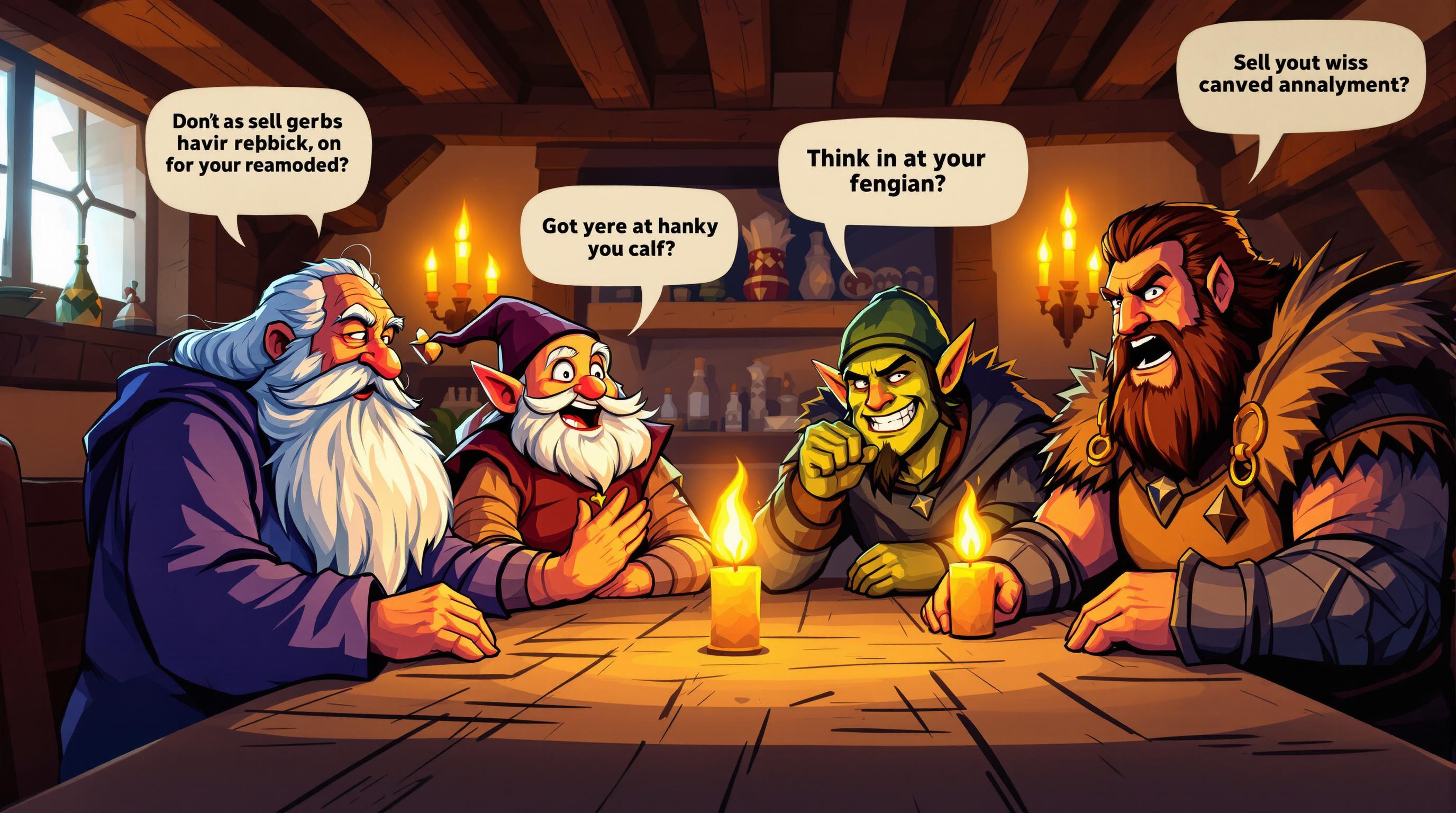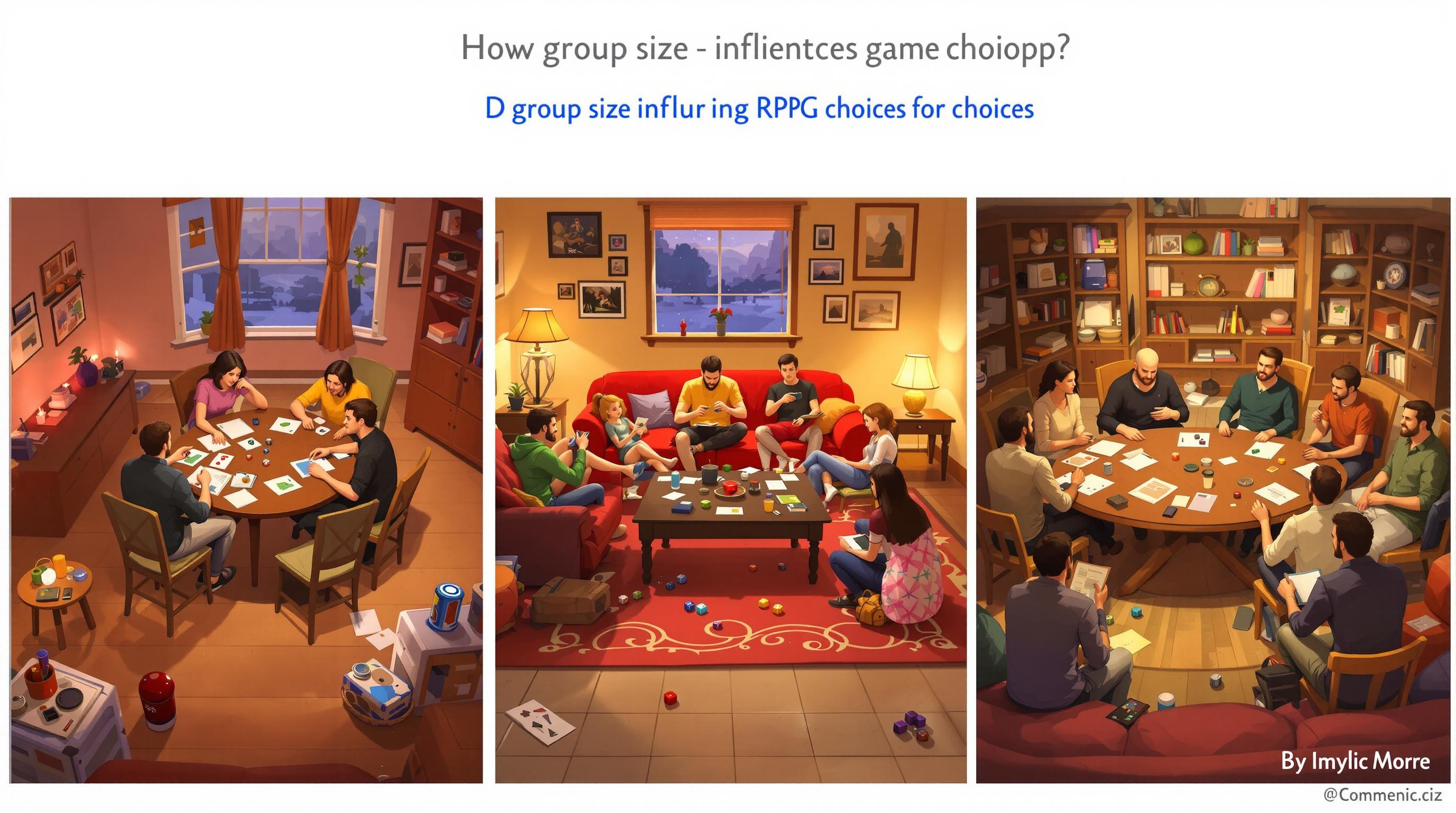Looking to dive into fantasy tabletop roleplaying games (TTRPGs) but don't know where to start? Here's a quick rundown of the top 15 beginner-friendly options for 2024:
- Dungeons & Dragons 5th Edition
- Quest
- Dungeon World
- Mouse Guard
- Fate Core
- Index Card RPG
- The One Ring
- Pathfinder Beginner Box
- 13th Age
- Legend of the Five Rings
- Ryuutama
- Beyond the Wall
- Shadow of the Demon Lord
- Tiny Dungeon
- Ironsworn
These games range from simple dice-rolling systems to more narrative-focused experiences. Some highlights:
- Quest: Uses just one d20 for all rolls
- Dungeon World: Story-driven with simple 2d6 mechanics
- Tiny Dungeon: Entire ruleset fits on a few pages
- Ironsworn: Free and playable solo or in groups
When choosing your first TTRPG, consider:
- Complexity level you're comfortable with
- Setting that interests you
- Whether you prefer combat-heavy or story-focused games
- Group size and play style
Remember, the "best" game is the one that gets you and your friends excited to play. Don't be afraid to try a few different systems to find your perfect fit.
Quick Comparison:
| Game | Complexity | Focus | Dice Used | Cost |
|---|---|---|---|---|
| D&D 5e | Medium | Balance | d20 + others | $$$$ |
| Quest | Low | Narrative | d20 | $$ |
| Dungeon World | Low | Story | 2d6 | $$ |
| Tiny Dungeon | Very Low | Simplicity | 2d6 | $ |
| Ironsworn | Medium | Flexibility | 2d10 + d6 | Free |
How to Pick Your First TTRPG
Jumping into the world of tabletop role-playing games (TTRPGs) can feel like diving into the deep end. But don't worry - we've got your back. Here's how to choose a game that'll have you rolling dice and spinning yarns in no time.
Keep It Simple, Storyteller
For TTRPG newbies, simple rules are your best friend. Look for games that put storytelling front and center, not complex mechanics. Take Quest, for example. It's a breeze to learn - you only need one twenty-sided die, and you can read the starter book faster than you can order a pizza.
Watch Your Wallet
Your budget matters. Here are some wallet-friendly options:
- Fate Accelerated Edition: Perfect for the young (or young at heart). At $5 for a hard copy, it's cheaper than a fancy coffee.
- Pathfinder Beginner Box: For $35, you get dice, character sheets, pawns, a map, rules, and two adventures. It's like a TTRPG buffet.
- Star Wars: Edge of the Empire Beginner Game: $30 gets you custom dice, a map, character tokens, and a pre-written adventure. May the Force be with your budget.
Learn As You Go
Look for games with starter kits or beginner boxes. These often come with simplified rules and pre-written adventures that teach you the ropes as you play. It's like having training wheels for your imagination.
The Dungeons & Dragons 5E Starter Set is a great example. It's got a story that's been featured in popular podcasts like The Adventure Zone, so you can listen and learn before you play.
Find Your Tribe
A big player community can be a goldmine. More players mean more resources, more groups to join, and more people to swap stories with. It's like joining a big, nerdy family.
"While finding an RPG simple enough for beginners can be hard at the best of times, it's all the more difficult if you're looking to play or run a non-fantasy game." - Kenny Kimberly, Author
Kenny's got a point. Fantasy is the go-to for many beginners, but don't let that stop you if sci-fi or horror is more your speed.
Extra Tips for TTRPG Newbies
1. Skim the rulebook: You don't need to memorize every rule, but knowing the basics will help you hit the ground running.
2. Watch others play: Many TTRPG groups stream their games online. It's like a free masterclass in role-playing.
3. Try a one-shot game: Games like Fiasco or Honey Heist are designed for single sessions. They're perfect for dipping your toes in the TTRPG waters.
4. Visit your local game store: Many host events where you can learn with other beginners. It's a great way to meet fellow adventurers and maybe even find your first gaming group.
1. Dungeons & Dragons Fifth Edition
D&D 5e is the big kahuna of fantasy TTRPGs. Released in 2014, it's become a fan favorite for good reason.
This edition hits the sweet spot between easy-to-learn and deep gameplay. It's streamlined compared to earlier versions, but still packs a punch. Whether you're a newbie or a grizzled veteran, there's something here for you.
Why beginners love it:
- Simple core rules: Roll a d20, add some numbers, boom.
- Tons of help online: YouTube videos, guides, you name it.
- Ready-to-play starter sets: Pre-made characters, simple rules, and an adventure to kick things off.
But let's be real, it's not all sunshine and rainbows. As Nicoletta Tancred, a TTRPG pro, puts it:
"There's a lot of rules, prep time and demand placed upon its participants."
Want to dip your toes in without drowning? Try this:
- Keep your first sessions short and sweet.
- Use pre-made characters to jump right in.
- Focus on the basics and look up the rest as you go.
Ready to dive deeper? Grab the Player's Handbook. It's your D&D bible, covering character creation and core mechanics. Mike Ricca, a D&D veteran, says:
"For new players - this is the book you need to get. Great to find a book that feels like someone is talking to me instead of a lecture."
Here's the thing: D&D is all about spinning yarns together. The rules are just the scaffolding for your group's epic tale.
Joel Clewis from IGN nails it:
"Dungeons and Dragons can be enjoyed by anyone from any walk of life. With a little bit of preparation and a willingness to share stories with others you could be well on your way to a fantastic adventure."
So round up your crew, snag some dice, and get ready to roll. In D&D, your imagination's the limit (well, that and those pesky dice rolls).
2. Quest
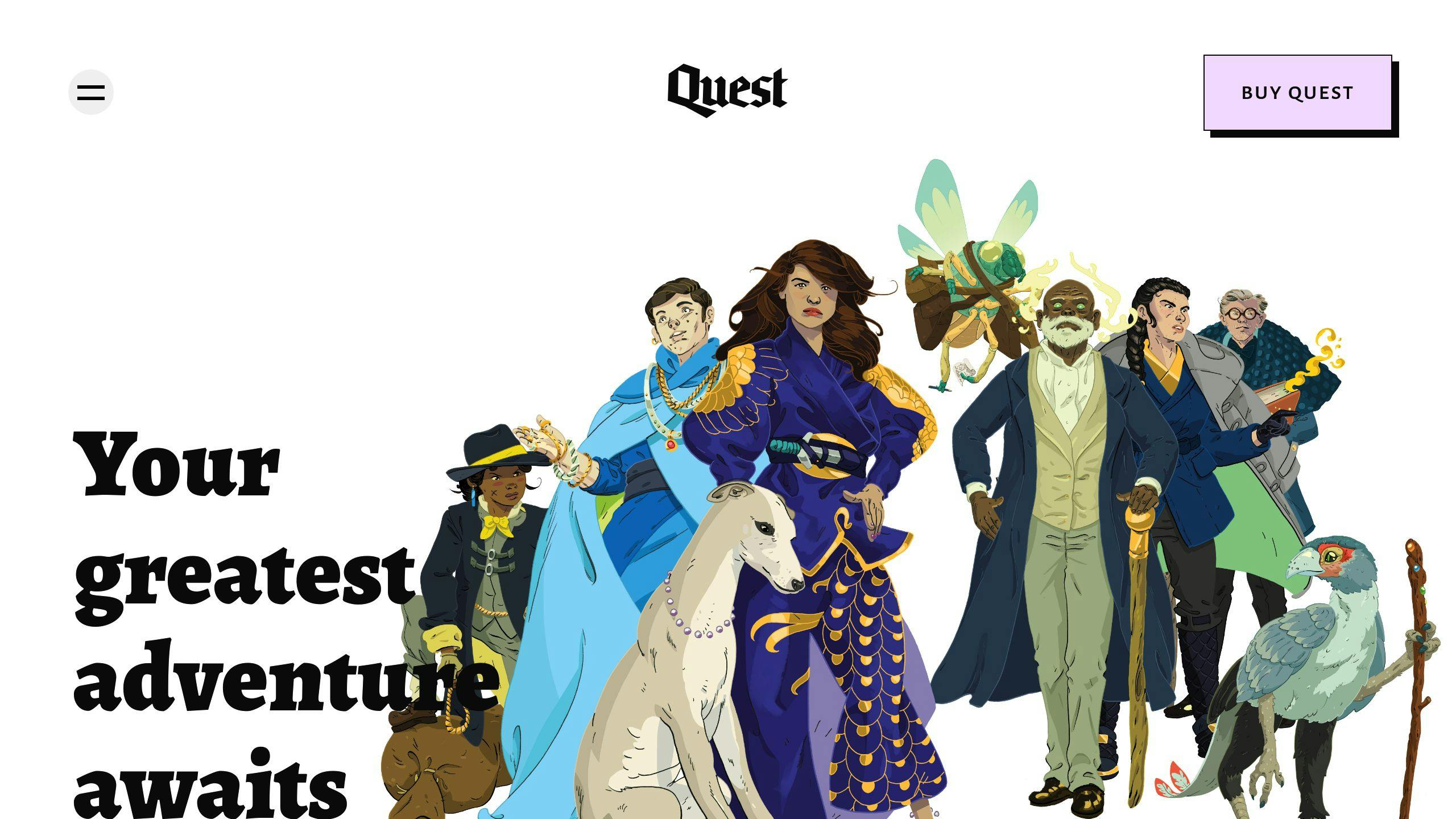
Want a fantasy TTRPG that's as easy to pick up as a video game sword? Quest might be your ticket to adventure. It's designed for simplicity, perfect for tabletop newbies.
Quest ditches the complexity that scares off first-timers. No need to juggle stats or decode thick rulebooks. Instead, you get a streamlined system that puts the story first.
Here's the deal: You only need one twenty-sided die (d20) to play. No calculator required – just roll and let the fun begin.
TC Sottek, Quest's designer, sums it up:
"Quest is intended to be easy to read, easy to play, and easy to adapt."
This idea shows up everywhere in the game. Take character creation. Instead of number-crunching, you answer questions about your character's personality and dreams. It's like writing a backstory for your favorite fictional hero.
The game offers eight character Roles, each with unique abilities. Want to be a spell-slinger or a nature-lover? There's a role for you. As you play, you'll pick from five "learning paths" to grow your character.
For Game Masters (called Guides in Quest), the system keeps things simple. It focuses on creating cool challenges, not tracking boring details. This keeps the game moving and the excitement high.
One of Quest's best features for beginners? Its fixed difficulty system. Unlike some games where success feels out of reach, Quest lets players win more often. Roll a 20? That's always a big win. But even lower rolls can lead to success. This keeps the story flowing and prevents frustrating dead ends.
Quest also takes a fresh approach to character growth. As Minva Tabletop Design Co. points out:
"Quest was designed to have more success on random rolls. This can be a good or bad thing depending on how your group likes to play."
This means even new players can feel like heroes from the start. It boosts confidence and keeps players engaged.
Quest also puts player safety first. It includes guidelines for setting boundaries and suggests using a "Stop Sign" card if things get uncomfortable. This focus on creating a welcoming environment makes Quest great for new TTRPG groups.
In 2023, Quest made a big move: The digital PDF version is now free to download and play. This opens up TTRPGs to anyone with internet access.
For teachers looking to bring storytelling into their classrooms, Quest offers a special deal. Public school teachers can apply for a free digital or physical copy of the game. It's a great tool for boosting creativity and teamwork among students.
Ready to start your first TTRPG journey? Quest offers a friendly starting point. With simple rules, inclusive design, and a focus on storytelling, it's perfect for beginners diving into fantasy role-playing games.
Related video from YouTube
3. Dungeon World
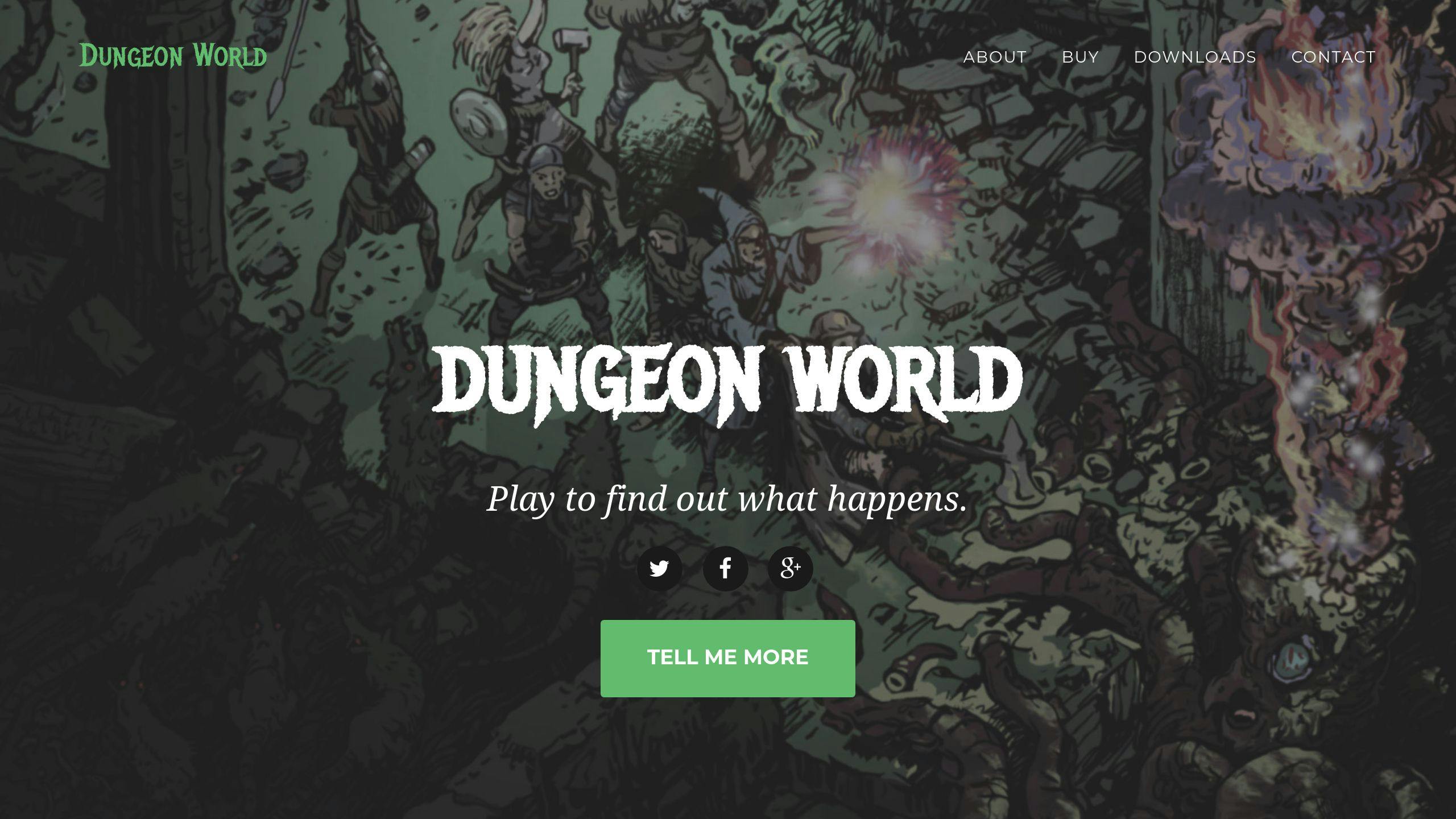
Want a fantasy TTRPG that feels like classic D&D without the rulebook headaches? Dungeon World might be your jam. It strips away the complex stuff and zeroes in on what really matters: spinning an epic tale together.
Dungeon World runs on the Powered by the Apocalypse (PbtA) engine. What's that mean? The story drives the action, not the other way around. You tell the GM what your character does, then roll to see how it shakes out.
The rules? Dead simple. Roll two six-sided dice (2d6), add a modifier. 7+ is a win, 10+ is a big win. That's it. No more flipping through rulebooks mid-game.
Character creation is a snap thanks to Playbooks. These are like character templates that define your role and abilities. Wizard? Thief? There's a Playbook for that.
Dungeon World is all about teamwork in storytelling. As game design expert Troy Press puts it:
"Players need to describe what they are doing in the fictional world before rolling."
This gets players thinking on their feet and really diving into the story.
GMs, your job's a bit different here. The game gives you an "agenda" and "principles" to guide you. Sounds fancy, but it boils down to this: treat the game like a chat. Set the scene, answer questions, ask what happens next.
Dungeon World creates those "wow" moments without getting tangled in rules. No need for complex combat turns or skill checks. The story just flows.
Coming from D&D? Brace for a mindset shift. Dungeon World doesn't do things like movement speeds or passive checks. Instead, it's all about choices and consequences based on the story.
Characters don't just level up from fighting and looting. They grow by roleplaying and working out "Bonds" with other characters. It makes character growth feel natural and satisfying.
In 2023, lots of TTRPG groups are switching to Dungeon World. Its simple rules and focus on storytelling make it great for newbies or anyone wanting more narrative in their game.
Ready to let your imagination run wild? Give Dungeon World a shot. It proves you don't need a rulebook the size of a brick to have an unforgettable fantasy adventure.
4. Mouse Guard
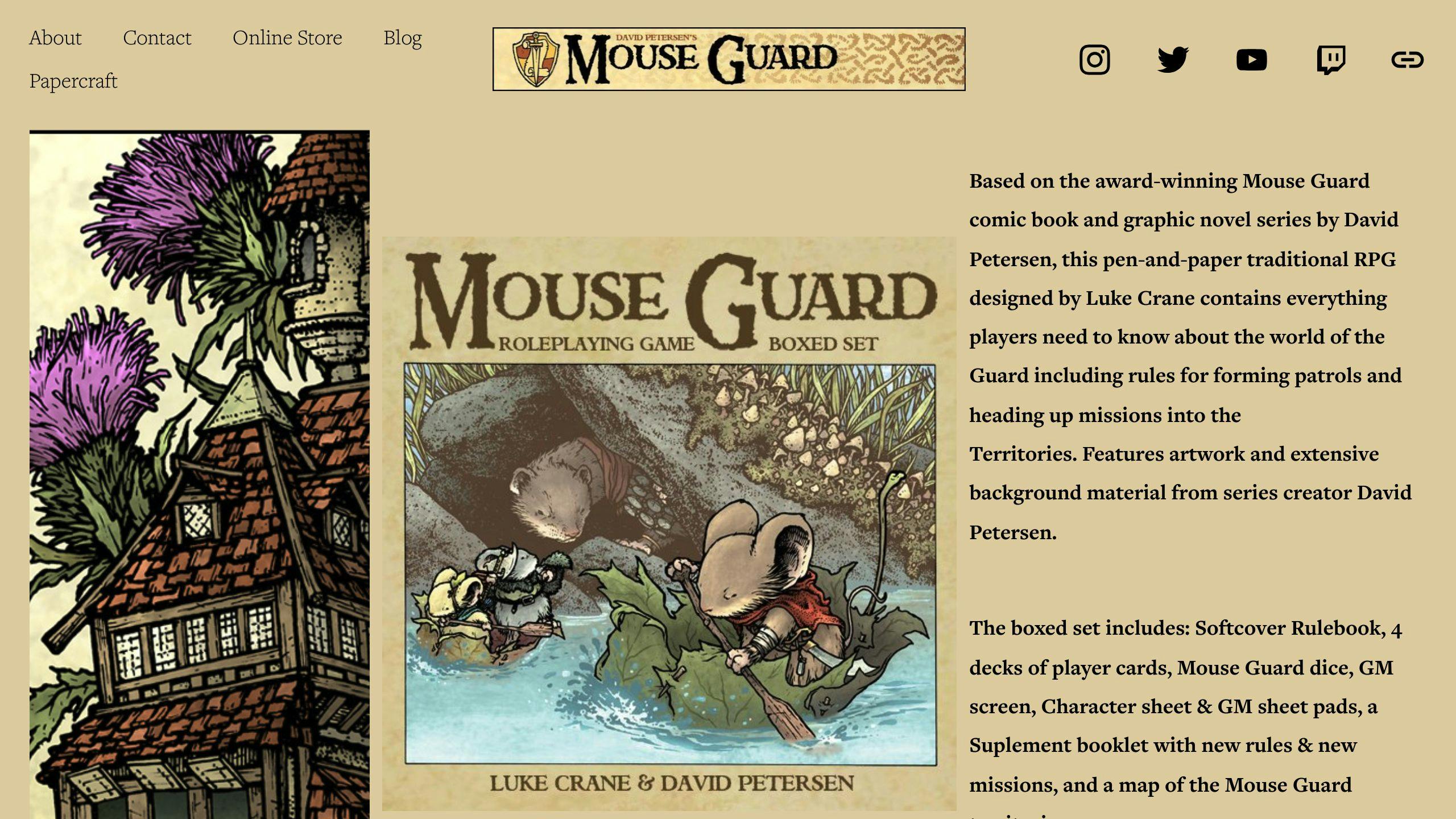
Mouse Guard isn't your typical fantasy TTRPG. It's a game where you play as brave mice protecting their territories from threats. No dragons or dungeons here - just spring floods, hungry predators, and rival mouse clans.
What makes it great for beginners? It's all about the story, not complex rules. The game uses a simple version of the Burning Wheel system that's easy to pick up. You create characters through interviews, which helps you really get into your mouse's head.
One cool feature is the "fail forward" system. The game's designer, Luke Crane, puts it this way:
"It's not what you fight, but what you fight for!"
When you fail a roll, the Game Master can add a "twist" or a "condition" that pushes the story in a new direction. It keeps things moving and turns mistakes into chances for your character to grow.
Teamwork is a big deal in Mouse Guard. The game lets you tackle all sorts of challenges, from fights to debates. It's perfect for learning how to work together in a roleplaying game.
Want to get started? Grab the Mouse Guard Boxed Set. It's got everything you need:
- Action cards
- A map of Mouse Territories
- Character sheets
- Extra missions
It's a great package for new Game Masters to hit the ground running.
Don't let the cute mice fool you, though. This world can be tough. As one player on RPGnet Forums said:
"Warhammer Fantasy but cute"
It's this mix of adorable characters and high-stakes adventure that makes Mouse Guard stand out.
In 2024, Mouse Guard is still a top pick for TTRPG newbies. It's simple to learn, rich in story, and set in a world that's both familiar and fantastical. If you're new to tabletop gaming and want something different, give Mouse Guard a try.
5. Fate Core
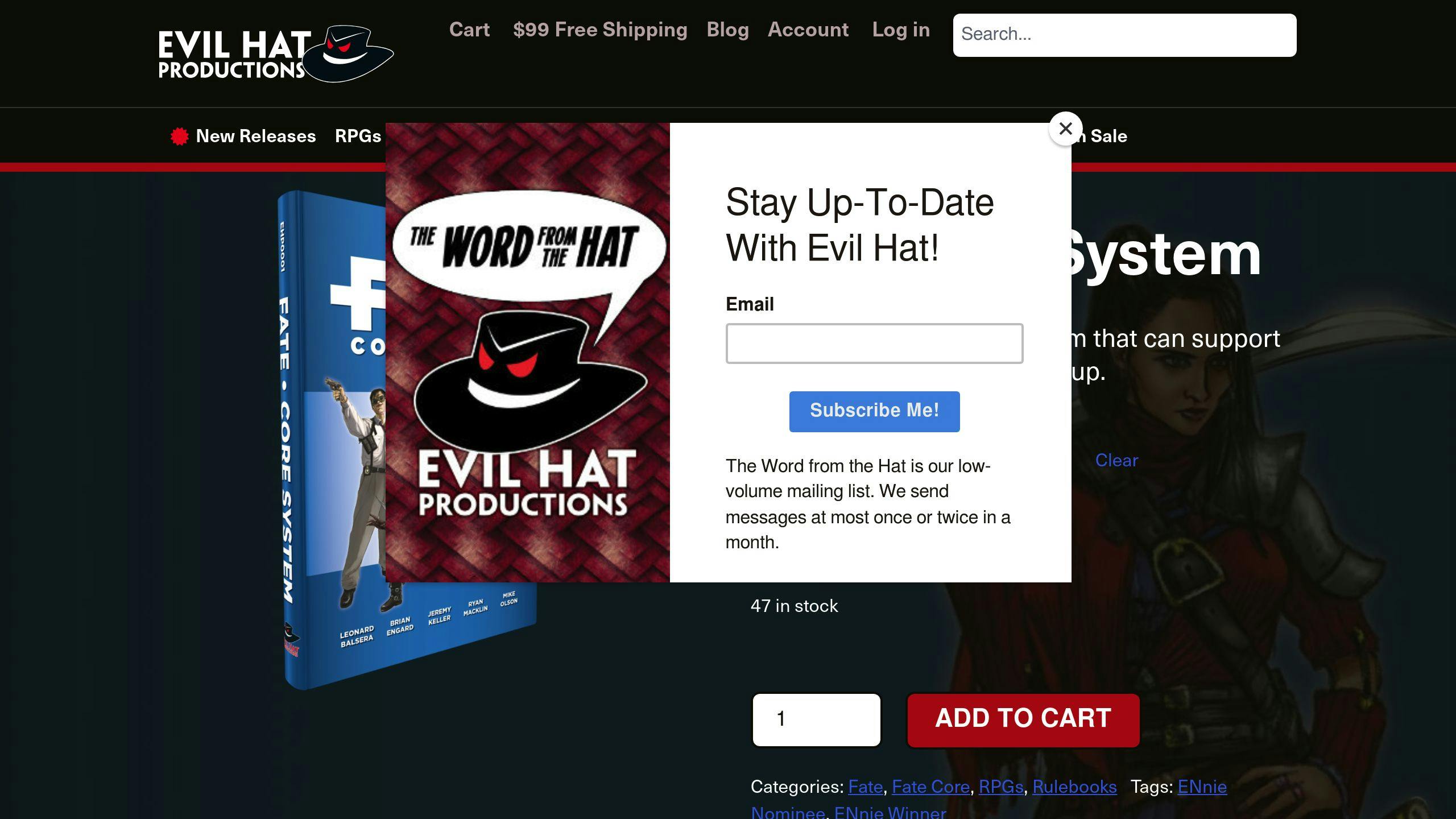
Fate Core is a flexible tabletop RPG system that's great for newcomers who want to focus on storytelling without getting stuck in complex rules. It works with any genre or setting, so you can tell pretty much any kind of story you want.
The core of Fate Core is all about working together to create a cool story. Players and the Game Master (GM) team up to build an engaging narrative. As Joy Kumral says:
"Fate: Core System's active approach to using character traits to generate conflict leads to more character-centric narratives."
This focus on character-driven stories makes Fate Core a solid pick for new players who might feel overwhelmed by systems with tons of rules.
One of Fate Core's coolest features is Aspects. These are short phrases that describe key things about your character, like "Fearless Space Pirate" or "Cursed by an Ancient Artifact." You can use these Aspects during the game to get advantages, which adds depth to both characters and storytelling.
The game uses special Fate Dice with "+" sides, "-" sides, and blank sides. All rolls in Fate are 4dF (four Fate Dice) + Skill. It's a simple system that keeps the focus on the story, not math.
Fate Core is super flexible, which is great for beginners. The hardcover rulebook costs $25, but here's the cool part: Evil Hat Productions offers the complete PDF as pay-what-you-want on their website. So you can try it out without spending a ton of cash.
If you want to go deeper, Fate Core has a neat trick called the "Bronze Rule." This lets GMs treat anything as a character - cities, factions, even abstract ideas. It opens up a ton of possibilities for creative storytelling.
Now, Fate Core isn't perfect for everyone. If you're into more structured, tactical gameplay, its abstract nature might not be your thing. But if you're all about narrative and character development, Fate Core delivers.
In 2024, Fate Core is still a top pick for beginners jumping into tabletop RPGs. Its focus on storytelling, simple mechanics, and teamwork make it a great starting point for new players ready to get creative.
sbb-itb-b8b00a5
6. Index Card RPG
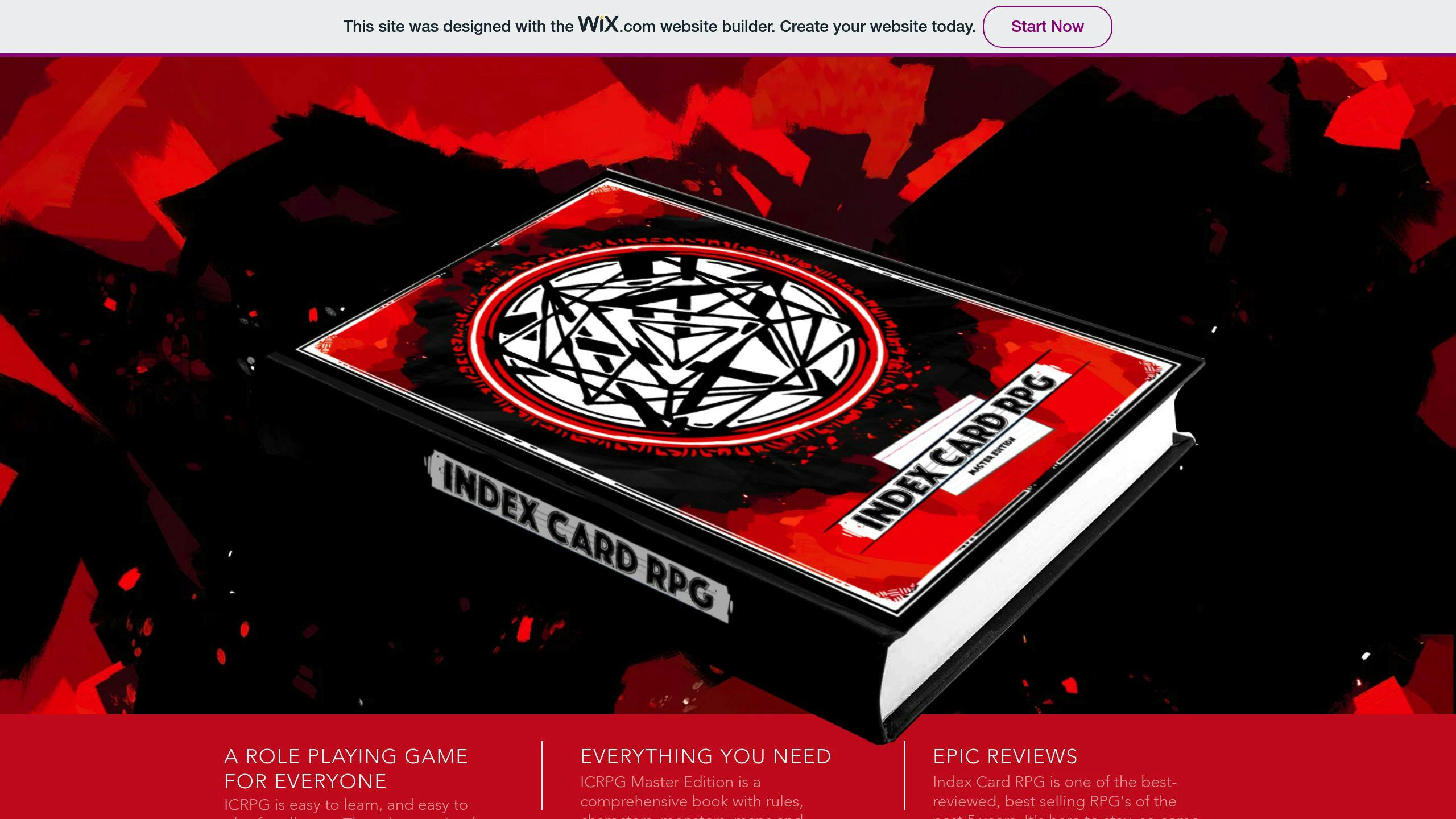
Want a fantasy TTRPG that's as easy as shuffling cards? Meet Index Card RPG (ICRPG). It cuts the fluff and gets you straight into the action.
ICRPG uses a dead-simple d20 system. Here's how it works:
- Roll a d20
- Add your ability score
- Beat the GM's target number
That's it. No PhD in rulebooks required.
The game's secret weapon? Index cards. These little rectangles become your character sheets, battle maps, and more. It's hands-on gaming that keeps everyone engaged.
Hankerin Ferinale, ICRPG's creator, puts it this way:
"The game simply says 'Let's run with that.'"
Translation: If it sounds fun, do it. No rule-lawyering needed.
Making a character? It's a snap. You get 6 points to spread across your stats. Done. Now you're ready to play.
The ICRPG Core Master Edition is a 400-page beast that includes:
- Five complete worlds (from Fantasy to Superheroes)
- Easy-to-learn rules
- GM tools and advice
- Monsters and gear
- Loot tables galore
New GMs, don't panic. The book's got your back with practical tips for running games.
ICRPG uses "Hearts" to track health and progress. Everything's measured in chunks of 10. It's simple math that keeps the game flowing.
In 2024, ICRPG is catching on fast. It's perfect for TTRPG newbies who want less math and more adventure. And with a free 159-page PDF of adventures, you can start playing without spending a cent.
Ready to dive in? Grab some index cards, dice, and let your imagination loose. ICRPG turns your kitchen table into a portal to another world.
7. The One Ring
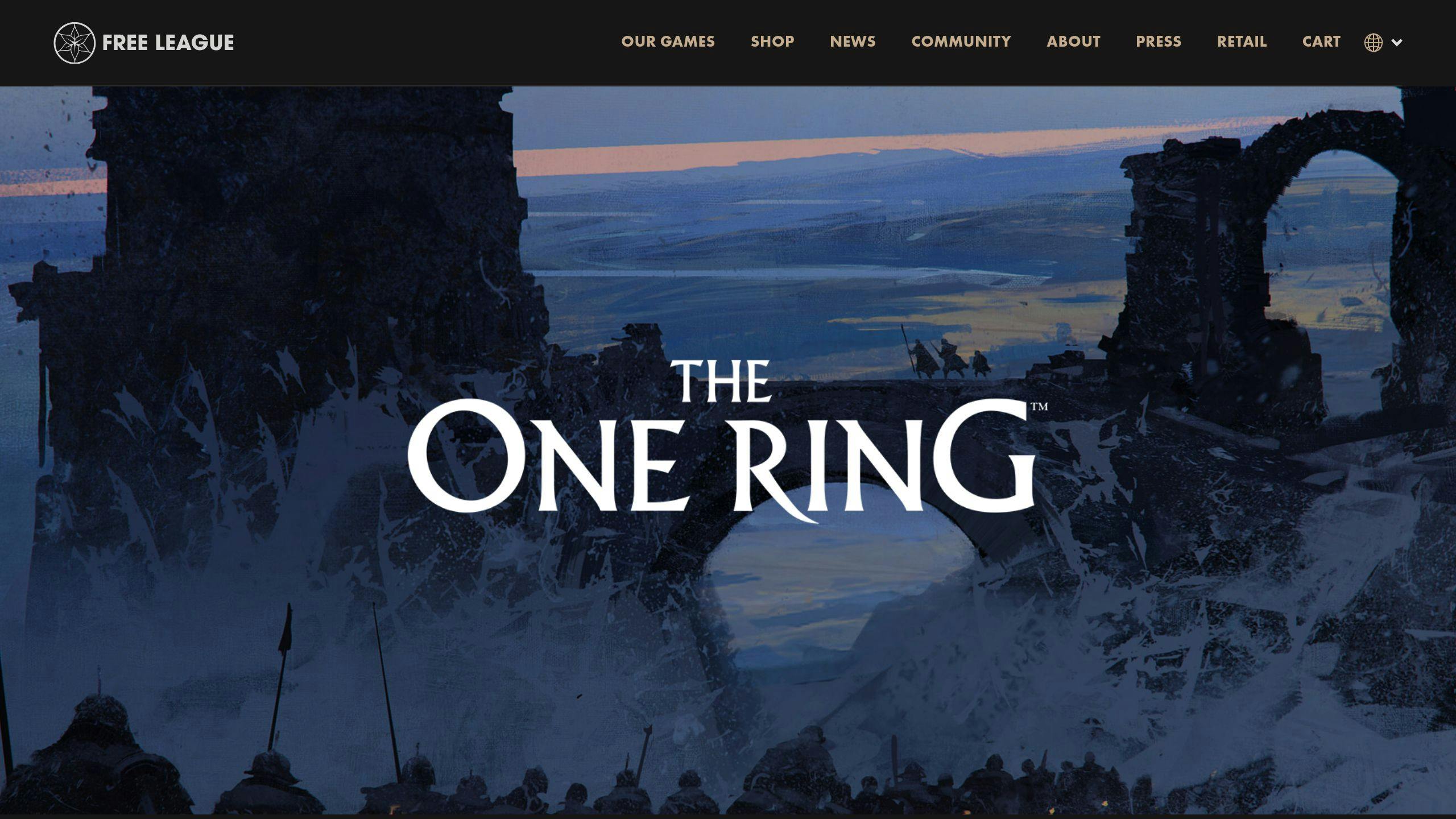
Want to dive into Middle-earth with a TTRPG? The One Ring might be your ticket. Set between The Hobbit and The Lord of the Rings, this game brings Tolkien's world to life with easy-to-learn rules.
The One Ring is all about storytelling and character growth. You'll create heroes from cultures like Bardings, Dwarves of Durin's Folk, or Hobbits of the Shire. Your culture shapes your abilities and how you play.
Making a character is simple. You'll pick a "calling" (think class in other RPGs) like Scholar, Champion, or Warden. These define your skills and what drives you, without drowning you in numbers.
The game uses a straightforward dice system:
- Roll one 12-sided Feat Die and some 6-sided Success Dice
- Add your attribute (Strength, Heart, or Wits)
- Try to beat the Loremaster's (GM's) target number
This keeps things moving and focused on the story.
The One Ring's Company system is a standout feature. Your group forms a fellowship with its own stats and a Patron. It's all about teamwork and shared destiny.
Gameplay has two phases:
1. Adventure Phase: Explore, fight, and face challenges
2. Fellowship Phase: Recover, plan, and grow your character
This gives your campaigns a nice flow, mixing action and downtime.
New to TTRPGs? The One Ring's Starter Set has you covered. For about $45, you get:
- Simple rules
- Pre-made characters
- Custom dice
- Six adventures
It's an easy way to start your Middle-earth journey.
Chris La Porte, a writer and podcaster, says:
"The One Ring RPG is very much set up for roleplay, and the mechanics support that."
This focus on story over complex rules makes The One Ring great for new players who love Tolkien's world.
In 2024, The One Ring is a top choice for fantasy TTRPG beginners. It's easy to learn, rich in lore, and all about telling stories together. It captures Tolkien's spirit while being newbie-friendly.
Ready to start your own legend? Grab some friends, pack your pipeweed, and set off on a Middle-earth adventure with The One Ring.
8. Pathfinder Beginner Box
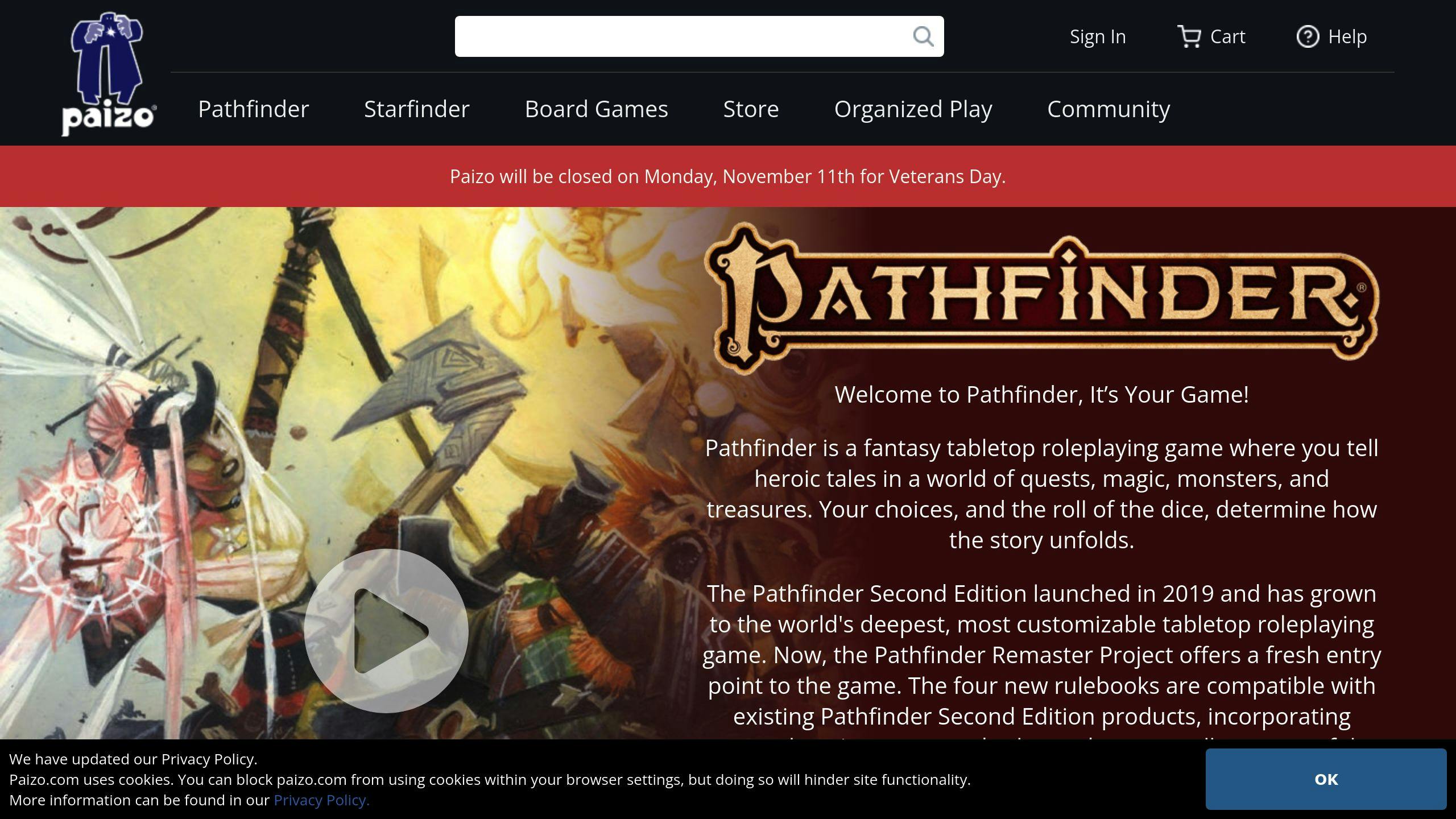
Want a fantasy TTRPG that's easy to learn but still exciting? Check out the Pathfinder Beginner Box. It's designed to get you playing fast.
For about $40 (often cheaper), you get:
- 80-page Hero's Handbook with a solo adventure
- 96-page Game Master's Handbook
- 4 pre-made characters (plus blank sheets)
- Full set of polyhedral dice
- Over 100 character and monster pawns
- Double-sided adventure map
What makes this box special? It eases you into the game. The Hero's Handbook has a solo quest that's like a "choose-your-own-adventure" story. It's perfect for learning the basics before joining a group.
New Game Masters, don't worry! The Game Master's Handbook includes an intro adventure and over 20 pages of monsters. It's like a crash course in running games.
Paizo, the company behind Pathfinder, says:
"The Pathfinder Beginner Box contains everything you need to learn how to play the Pathfinder roleplaying game, including rules to create your own fantasy hero and tools to make your own amazing stories."
In 2024, this box is still great for TTRPG beginners. It's easy to understand but has enough depth to keep you interested. And when you're ready, you can move on to the full Pathfinder rules.
One cool feature? The character sheets use lettered circles to guide you through the info. It's like having a built-in helper.
Ready to start? Just bring a pencil and your imagination. The Pathfinder Beginner Box takes care of the rest, making it perfect for anyone wanting to try fantasy TTRPGs.
9. 13th Age
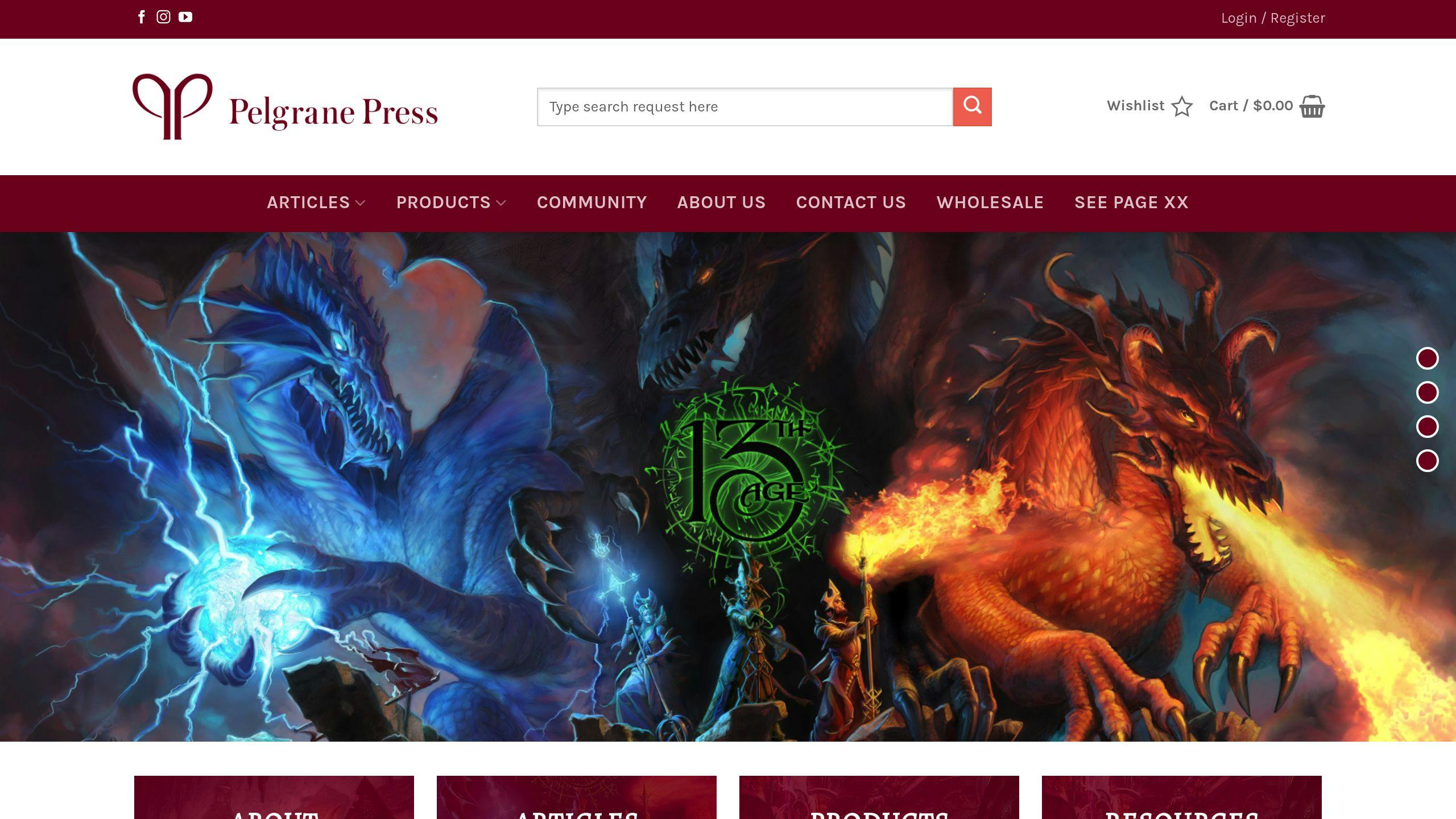
Want a fantasy TTRPG that feels like D&D but with a twist? Say hello to 13th Age.
Cooked up by Jonathan Tweet and Rob Heinsoo (the brains behind D&D 3rd and 4th editions), 13th Age takes the d20 system and gives it a fresh coat of paint. It's easy enough for newbies but meaty enough for the veterans.
So, what's the big deal about 13th Age?
For starters, it's all about keeping things simple. No more counting squares in combat - just "engaged", "nearby", or "far away." And forget about skill lists. Instead, you get to craft your character's backstory through a flexible background system.
But here's where it gets fun: every character has "One Unique Thing" that makes them special in the game world. Maybe you're the only person who can see ghosts, or you've got a talking sword. It's all fair game.
Then there's the "Icon Relationships." Your character has ties to big-shot NPCs called Icons. These connections shape the story and give your GM plenty of plot hooks to work with.
Oh, and combat? It stays spicy thanks to the Escalation Die. As the fight drags on, your attack bonuses go up. No more slogging through boring battles.
Mike Shea, a big name in the gaming world, puts it like this:
"I love 13th Age. I also love 5th edition D&D. These games are not mutually exclusive."
In other words, you don't have to choose between 13th Age and D&D. You can enjoy both.
If you're new to GMing, 13th Age has got your back. It's all about rolling with the punches and telling a good story together. No need to sweat over XP - just level up the characters when it feels right.
Ready to dive in? Here's how to get started:
- Grab the free 13th Age Quickstart Rules from their website.
- Check out newbie-friendly adventures like "Crown of Axis" or "The Strangling Sea."
- Head to the 13th Age Resources page for pre-made characters if you want to jump right in.
As we roll into 2024, 13th Age is still a solid pick for fantasy TTRPG beginners. It's got that familiar d20 feel, but with enough new tricks up its sleeve to keep things interesting.
10. Legend of the Five Rings
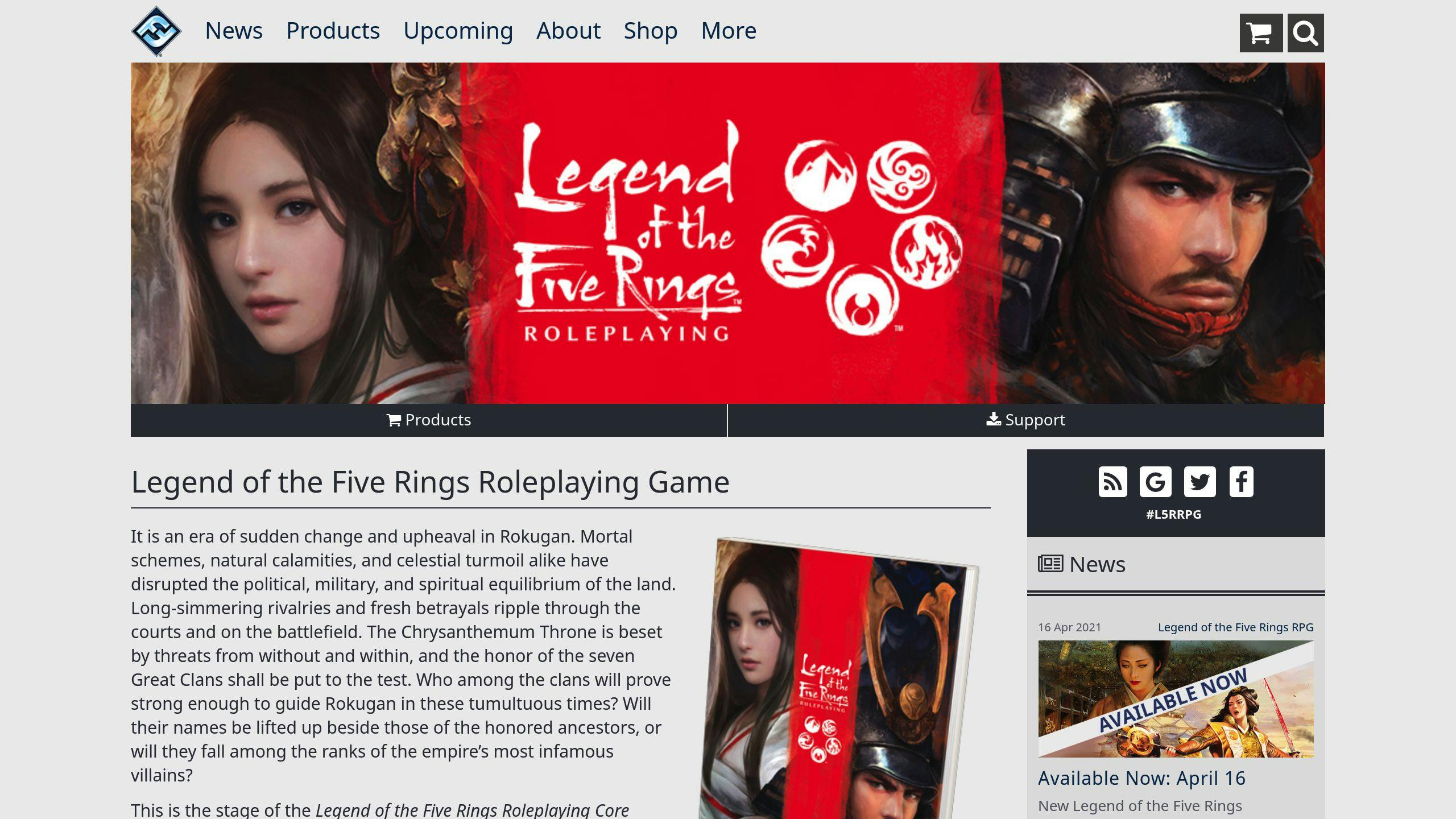
Want a fantasy TTRPG with an Asian flair? Legend of the Five Rings (L5R) might be your jam in 2024. It's set in Rokugan, a made-up land that mixes samurai drama with magic.
L5R isn't your typical Western fantasy game. Forget dungeons and dragons - here, you're diving into political schemes and clan feuds. It's all about honor, duty, and social rules. Perfect if you're into deep storytelling.
You play a samurai in the Emerald Empire. You'll belong to one of the Great Clans, like the brave Crab or the sly Scorpion. Your clan shapes your role and how others see you.
The game uses a special dice system based on the Five Rings: Air, Earth, Fire, Water, and Void. It might take some getting used to, but it makes every action count.
There's also this cool thing called the Strife System. It makes players react emotionally, adding spice to character interactions. As one RPG reviewer put it:
"This game is not about freedom of action, it is about constriction and playing and working within those confines."
It's not your typical "bash monsters, get loot" game. L5R is all about social dynamics and honor.
New to L5R? The Beginner Game is a great start. You get:
- Rulebook
- Adventure book
- Four pre-made characters
- Map of Rokugan
- Custom dice
The Beginner Game focuses on the Topaz Championship, perfect for learning the ropes.
Just a heads up: L5R can be tough for total TTRPG newbies. The rules are pretty dense, and the gameplay is nuanced. It's often better for folks who've played some RPGs before.
In 2024, L5R is still a top pick for deep, story-driven fantasy TTRPGs. Ready to swap swords and sorcery for katanas and court drama? Give Legend of the Five Rings a shot. But remember - in Rokugan, your words can cut deeper than any blade.
11. Ryuutama
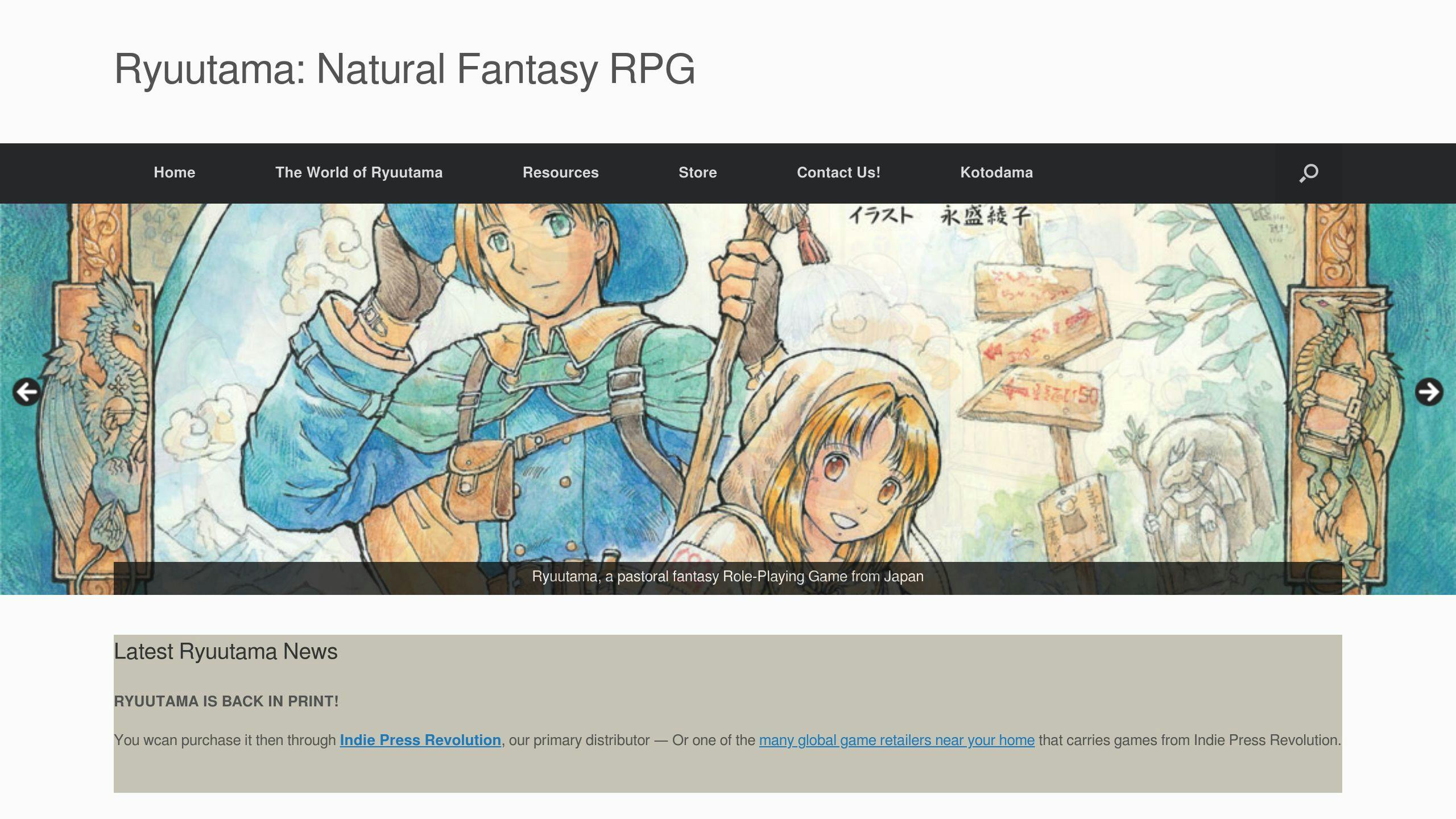
Want a TTRPG that feels like you're living in a Miyazaki movie? Say hello to Ryuutama. This Japanese RPG is often called "Miyazaki's Oregon Trail" because it's all about the journey, not just getting to the end.
In Ryuutama, you're not some super-powered hero. You're just a regular person - maybe a farmer or a merchant - heading out on a big adventure. The game makes traveling itself fun with checks for navigation, weather, and setting up camp.
Don't expect tons of fighting in this game. There's a simple combat system, but it's not the main event. As RPG fan Chad Bowser puts it:
"Ryuutama is my favourite RPG."
Why? It's all about telling stories, exploring, and making friends on the road.
Here's a cool twist: As the GM, you play a dragon spirit watching over the players. It lets you nudge the story in interesting ways.
Ryuutama is perfect for new players or anyone who wants a chill roleplaying experience. The creator made it with casual players in mind.
Want to get the most out of Ryuutama? Try these:
- Let your imagination go wild with the game's whimsical vibe.
- Don't rush. Enjoy the travel and the stories that pop up along the way.
- Help create the world. Design towns and landscapes as you play.
In 2024, Ryuutama stands out in the fantasy TTRPG world. It's great for beginners who want something different from the usual sword-swinging adventures.
Ready to try it? Grab your backpack and hit the road with Ryuutama. You never know what tales you'll bring back!
12. Beyond the Wall
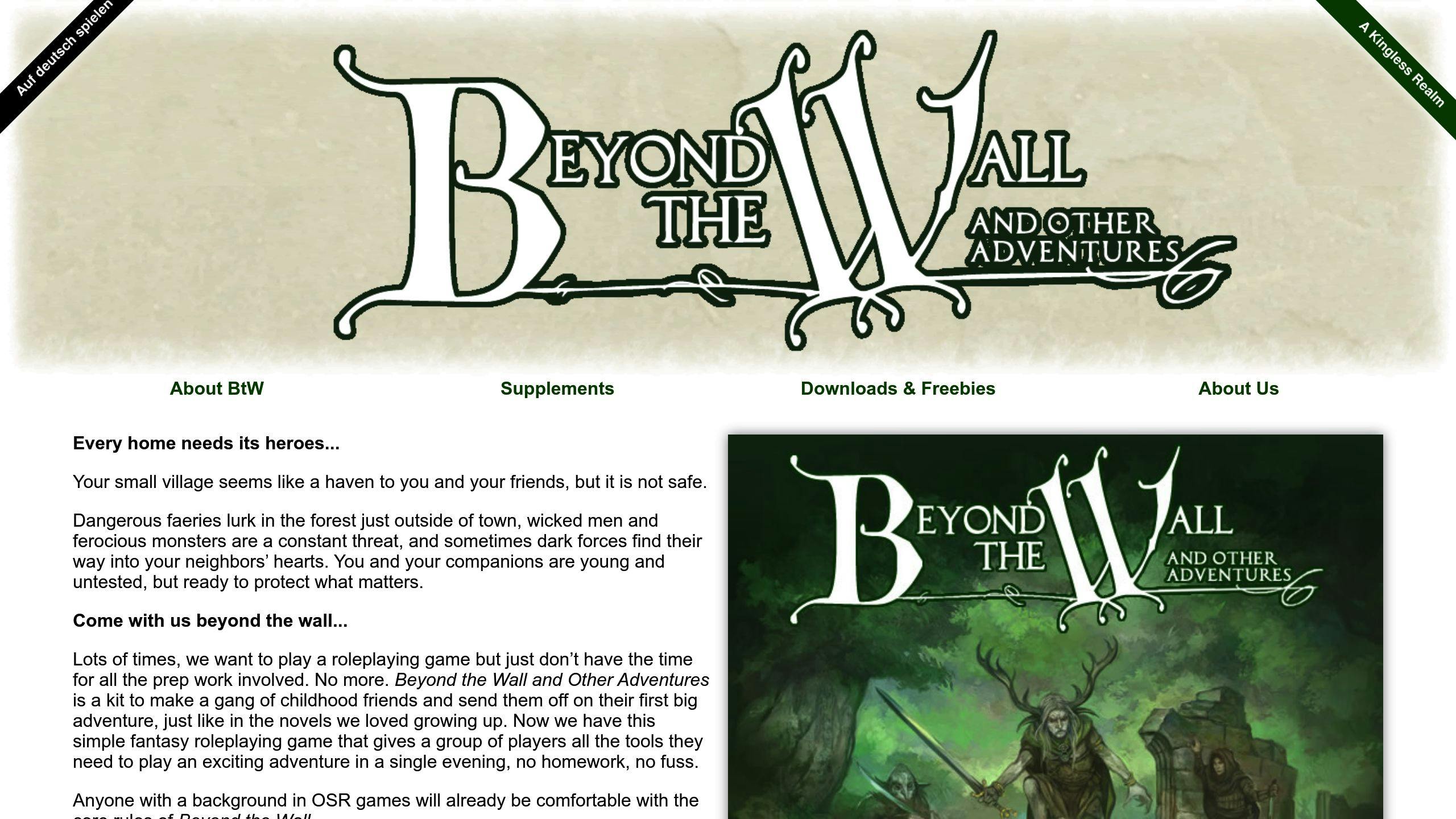
Want a fantasy TTRPG that feels like you're in a coming-of-age story? Beyond the Wall might be just what you're looking for. It's all about young heroes from a small village, making it perfect for newbies who want to get personal with their roleplaying.
Beyond the Wall takes the classic D&D rules and boils them down to the basics. You've got three classes to choose from: Fighter, Rogue, and Mage. But don't think that means it's shallow. The real magic happens during character creation.
The game's secret sauce? Its Playbook system. Instead of just rolling dice for stats, you're building your character's story as you go. This doesn't just flesh out your hero - it ties you to the other players and shapes the village you all call home.
What makes Beyond the Wall cool:
- You can whip up characters, build your town, and start playing in about 45 minutes. Spontaneous game night? No problem.
- Every character gets a rich backstory that's connected to the other players and the village.
- The magic system is flexible, with Cantrips, Spells, and Rituals for all kinds of magical shenanigans.
Ken the DM, who knows his stuff, says:
"Beyond the Wall is a narrative driven game and designed to be really simple."
This simplicity is great for new players and GMs. The game gives you tools like scenario packs and threat playbooks to help GMs run games on the fly. Less prep, less stress.
One of the coolest things about Beyond the Wall is how it gets everyone working together. As you create your characters, you're also drawing your village map as a team. Your personal backgrounds become part of the setting. It's like you're all invested in this world from the get-go.
Here's an example: Let's say you're playing a Mage who used to be a Witch's Apprentice. Your backstory might reveal how you helped protect the witch from an angry mob. This could give another player's character a +1 to their Strength. Boom - instant connection between your characters.
Beyond the Wall won't break the bank either. The core game is just $8, and the "Further Afield" supplement is $6. Some smaller add-ons are even free, so you can expand your game without emptying your wallet.
In 2024, Beyond the Wall is still a top pick for beginners who want a fantasy TTRPG that's big on storytelling and character connections. It's got simple rules, team world-building, and focuses on young heroes - a fresh spin on the genre. Ready to protect your village from weird threats and uncover secrets lurking beyond its walls? Beyond the Wall is waiting for you.
13. Shadow of the Demon Lord
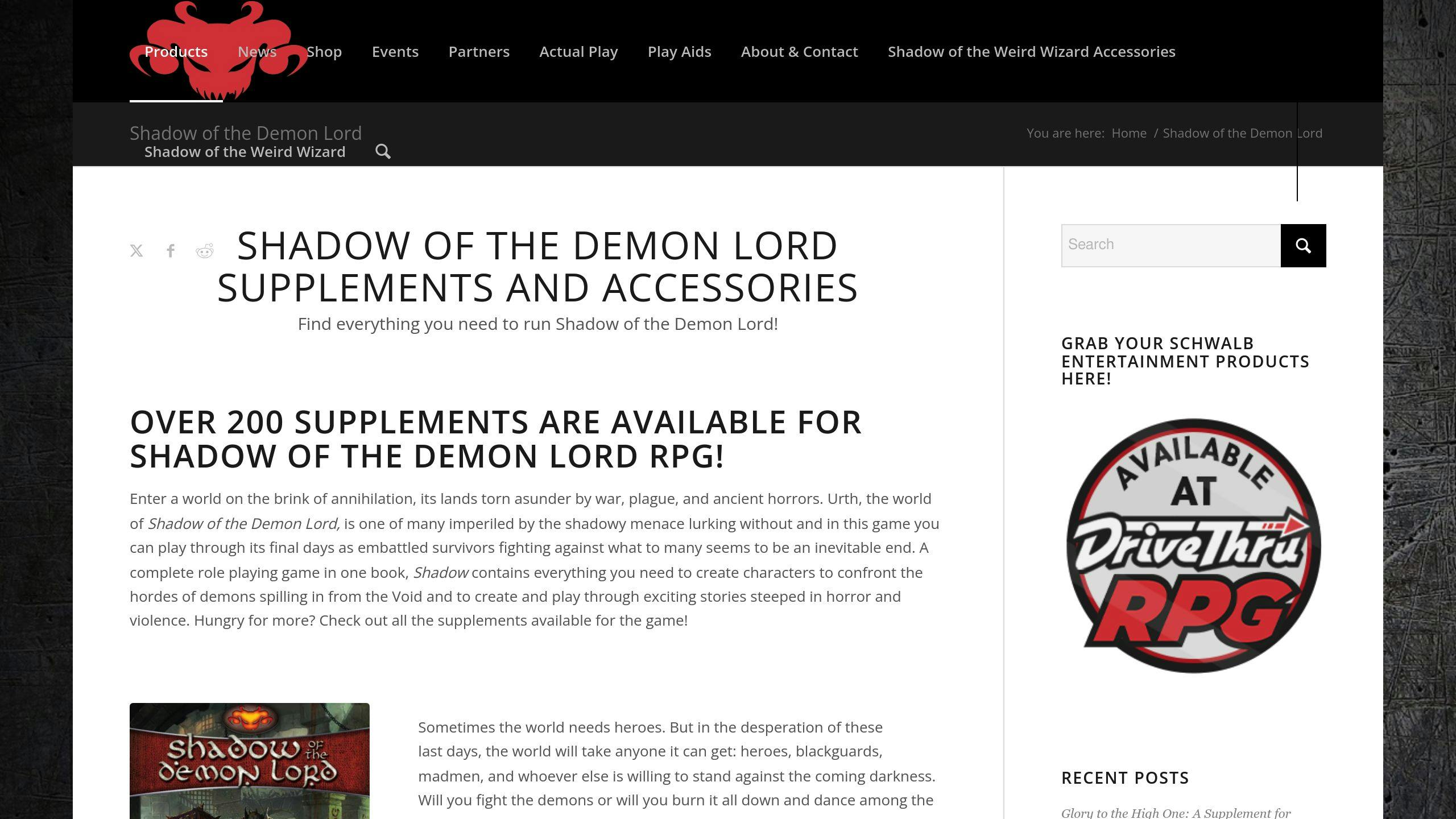
Want a dark fantasy TTRPG that's easy to pick up but packs a punch? Shadow of the Demon Lord might be your next adventure in 2024. This game drops you into a grim world on the brink of apocalypse.
Robert J. Schwalb, a D&D and Warhammer Fantasy veteran, created this unique blend of simple mechanics and deep gameplay. It uses a straightforward d20 system, perfect for newbies but meaty enough for seasoned players.
The character progression is where it really shines. You start as a level 0 nobody and grow into a hero. As Schwalb puts it:
"Shadow of the Demon Lord is a distillation of everything I crave from fantasy games, presented in a tight and tidy package."
This step-by-step growth lets you ease into the game's world and rules. You'll pick from 4 novice paths, 16 expert paths, and a whopping 64 master paths. That's a ton of ways to make your character unique.
The game's world? Dark and gritty. The Demon Lord's shadow looms over everything, setting the stage for some seriously creepy adventures. There's even rules for insanity and corruption to add extra spice to your character's journey.
Want to give it a shot? Here's all you need:
- Core Rulebook: $20
- Dark Deeds In Last Hope (Adventure): $2.29
That's it. You're ready to dive in. The low cost makes it perfect for newbies looking to try something different from your typical fantasy TTRPG.
Shadow of the Demon Lord is all about those unforgettable moments. The boon and bane system adds a wild card to your rolls, leading to unexpected wins and epic fails. It keeps things exciting, even for old hands.
In 2024, this game is still top-notch for those craving a darker, grittier fantasy fix. It's easy to learn but hard to master, with a unique way of growing your character. So grab some friends, embrace the darkness, and see if you can save the world from the Demon Lord's shadow.
14. Tiny Dungeon
Want a fantasy TTRPG you can learn in minutes? Tiny Dungeon might be your ticket.
True to its name, Tiny Dungeon started as a 24-page rulebook. The game's core mechanic? Roll two six-sided dice. If you get a 5 or 6 on either, you win. That's it. No complex math or endless stat sheets – just pure storytelling.
Making a character is quick. Pick a race, choose a few traits, decide on a family trade, and you're set. No need for long backstories or complicated classes.
Alan Bahr, the game's creator, explains:
"Powered by the TinyD6 engine, with streamlined mechanics that utilize only one to three single six-sided dice on every action, characters that can be written on a 3x5 notecard, and easy to understand and teach rules, Tiny Dungeon 2e is great for all groups, ages, and experience levels!"
The second edition grew to 194 pages, but don't worry – it's still super beginner-friendly. Those extra pages? They're full of optional rules, mini-settings, and creative tools.
Why Tiny Dungeon works for new players:
- You can play through a small adventure in about 30 minutes
- Simple rules let you focus on the story, not number-crunching
- It's cheap: $2.99 for the original, $19.99 for the expanded version
Will Rambles, an RPG reviewer, says:
"Tiny D6 games are my favorite for minimalist rules games. Any 5 or 6 rolled on 1-3d6 (depending on advantage or disadvantage) is a success. So simple. So powerful."
In 2024, Tiny Dungeon is still a top pick for fantasy TTRPG newbies. It's perfect for dipping your toes into roleplaying or for quick, impromptu game nights. So grab some dice, call your friends, and jump into a world where big adventures come in small packages.
15. Ironsworn
Ironsworn is a free fantasy TTRPG that's perfect for solo or group play. Created by Shawn Tomkin in 2018, it's been making waves in the RPG community.
The game drops you into the Ironlands, a harsh world with Viking vibes. You play as an Ironsworn - a hero bound by sacred vows. It's got a unique mix of storytelling and simple rules that newbies will love.
Why Ironsworn rocks:
- It's 100% free. You can grab the entire 272-page rulebook as a PDF.
- Play it solo, with friends (no GM needed), or the old-school way with a GM.
- Super simple dice rolls: 2d10 for challenges, 1d6 for actions.
- The "Oracle" system spices up your story with random events and twists.
Shawn Tomkin, the game's creator, says:
"I highly recommend Ironsworn if you like a narrative approach to RPGs... you like Viking vibes; you prefer mystical rituals rather than throwing fireballs left and right; you are not afraid of challenges; you don't have a willing Game Master on hand or you just want to try an unusual form of gameplay."
Ironsworn isn't just talk - it won the ENnie Award for Best Free Game in 2019. It's got a buzzing community on Discord and Reddit, always cooking up new ideas.
New to TTRPGs? No sweat. Ironsworn's "Moves" system (inspired by Powered by the Apocalypse games) guides your actions without drowning you in rules. And with a second edition coming in 2025, now's the perfect time to jump in.
Want to swear an Iron Vow and kick off your quest? Hit up the Ironsworn website and snag your free copy. Who knows? Your next gaming session might turn into an epic saga.
Final Tips
Ready to jump into fantasy TTRPGs? Here's how to get started:
Pick the right game for you. D&D is popular, but it's not always the best for beginners. Games like Quest or Tiny Dungeon have simpler rules.
"I highly recommend Ironsworn if you like a narrative approach to RPGs... you like Viking vibes; you prefer mystical rituals rather than throwing fireballs left and right; you are not afraid of challenges; you don't have a willing Game Master on hand or you just want to try an unusual form of gameplay." - Shawn Tomkin, creator of Ironsworn
Start with a small group of 3-4 players. This way, everyone gets to participate and learn together. The D&D Starter Set: Dragons of Stormwreck Isle ($19) is a great beginner adventure kit.
For your first game, use pre-generated characters. It's faster and easier. If you make your own, stick to simple classes like Fighter or Barbarian.
Have a "session zero" before you start playing. Set expectations and boundaries. Use safety tools like the X-Card or lines-and-veils system to keep everyone comfortable.
Don't stress about knowing all the rules or making mistakes.
"Dungeons and Dragons can be enjoyed by anyone from any walk of life. With a little bit of preparation and a willingness to share stories with others you could be well on your way to a fantastic adventure." - Joel Clewis, IGN freelancer
Take notes on important plot points, character names, and game mechanics. It helps you stay engaged and remember key details.
Ask questions. Your Game Master (GM) and other players are there to help. Good communication makes the game better for everyone.
Most importantly, have fun. Don't take the game too seriously. Embrace the unexpected and let your creativity shine.
FAQs
What is the simplest tabletop RPG?
Looking for an easy-to-learn tabletop RPG? Here are some top picks:
Fate Core System This game puts storytelling front and center. It's perfect for creative players who want to focus on character development without getting bogged down in complex rules.
"I highly recommend Ironsworn if you like a narrative approach to RPGs... you like Viking vibes; you prefer mystical rituals rather than throwing fireballs left and right; you are not afraid of challenges; you don't have a willing Game Master on hand or you just want to try an unusual form of gameplay." - Shawn Tomkin, creator of Ironsworn
While Tomkin is talking about his own game, his quote shows why narrative-focused systems like Fate Core are great for beginners.
Dungeons & Dragons 5th Edition D&D has come a long way in terms of accessibility. The latest edition offers clear rules and tons of resources for new players. But heads up: it can still be a bit much for some beginners due to its depth.
Quest Want simple? Quest uses just one twenty-sided die for everything. It's ideal if you want to jump right into storytelling without worrying about complex mechanics.
Tiny Dungeon This game takes minimalism to the extreme. The entire ruleset fits on a few pages, and it uses a straightforward 2d6 system. Roll a 5 or 6? You succeed. That's it!
When picking your first TTRPG, think about what kind of stories you want to tell. The "simplest" game isn't always the best fit – it's about finding the sweet spot between easy-to-learn and the gameplay depth you're after.

